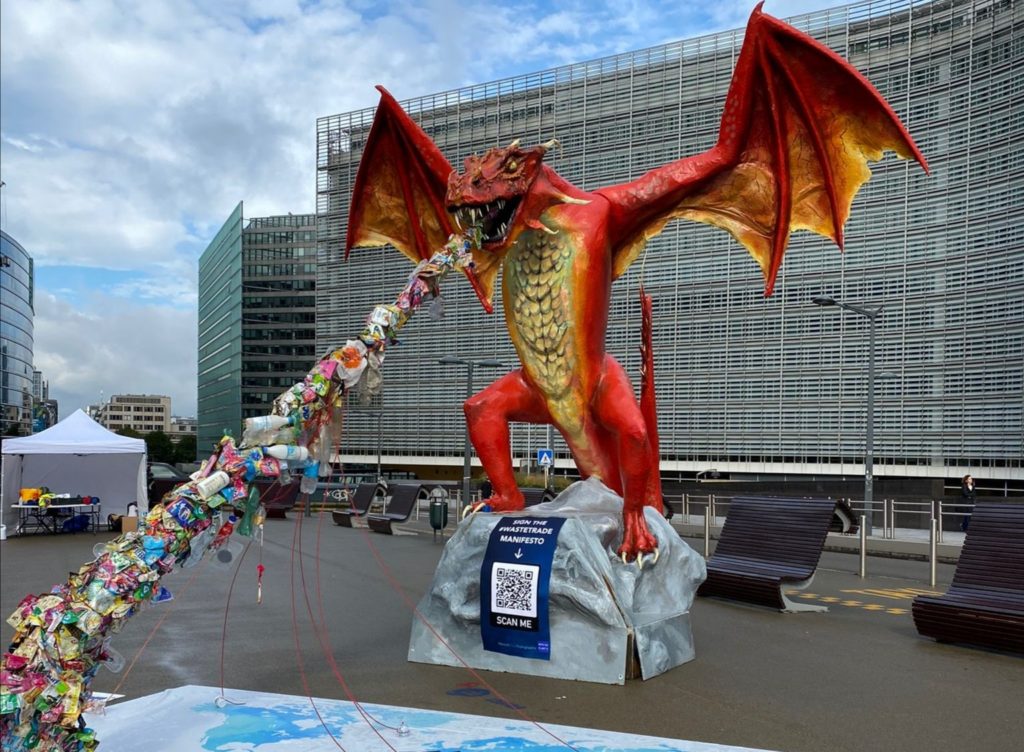A four-metre-long plastic-spewing dragon was placed in front of the European Commission's headquarters on Wednesday to draw attention to the EU's waste export policy.
Environmental organisations and various MEPs gathered outside the Berlaymont to introduce a manifesto calling for a regulation that prohibits the export of waste generated within the EU to third countries.
"We brought the dragon spitting plastic waste onto the world to tell the EU institutions the scale and impact of its plastic waste generation," Pierre Condamine, Zero Waste Europe's Waste Policy Officer, told The Brussels Times.
The EU is one of the largest exporters of plastic waste in the world: Six countries in the top ten global exporters are EU Member States, including Belgium, as well as Germany, Netherlands, France, Italy and Slovenia.
In 2020, 2,4 million tonnes of plastic waste were shipped from the EU to third countries, which is equivalent to 4,5 tonnes per minute.
The European Commissioner for the Environment, Fisheries and Oceans, Virginijus Sinkevicius, who was handed the manifesto, recognised that "real action" was needed to deal with the challenge facing the EU when it comes to waste treatment.
Sinkevicius stressed that the Commission is working on a new proposal that will be tabled in October and will clearly state that transferring EU waste to third countries will be banned if it cannot be proven that a country wants to treat the waste and has the capacity to do so in a sustainable way.
The #WasteTrade manifesto has been presented to EU Commissioner @VSinkevicius.#Plastic Waste Trade, your time is up. pic.twitter.com/fazGrIvln0
— Zero Waste Europe (@zerowasteeurope) September 29, 2021
However, for many organisations, including the Environmental Investigation Agency (EIA), the ban should extend to all exports.
Related News
- 'Hugely historic': Healthy environment could become fundamental right
- 'The polluter pays': Flanders raises taxes on incineration of industrial waste
According to Zero Waste Europe, exporting plastic waste allows the EU to "avoid its responsibility to deal with high volumes of waste and more difficult-to-treat plastic," while externalising the true costs of proper waste management to other countries "whose treatment infrastructures are often already overwhelmed."
Harmful to communities
The manifesto, signed by 35 MEPs and more than 60 international environmentalist organisations, stated that, alongside burdening third countries' waste treatment infrastructure, mismanaged recycling operations can lead to substances and chemicals that are harmful to the environment being inserted into the soil, water and the air of these countries.
"This plastic waste is causing great environmental and health damages for the receiving communities. With a new proposal for the EU legislation on waste shipments coming in a few weeks, we hope bold actions will be taken to end those practices," Condamine said.
Sinkevicius highlighted that, at least partly tackle this issue, a reform of the European directive on used packaging and packaging waste to "fight against excess packaging" will be presented in November, adding that companies will be held more accountable when it comes to their involvement in the entire waste chain.

